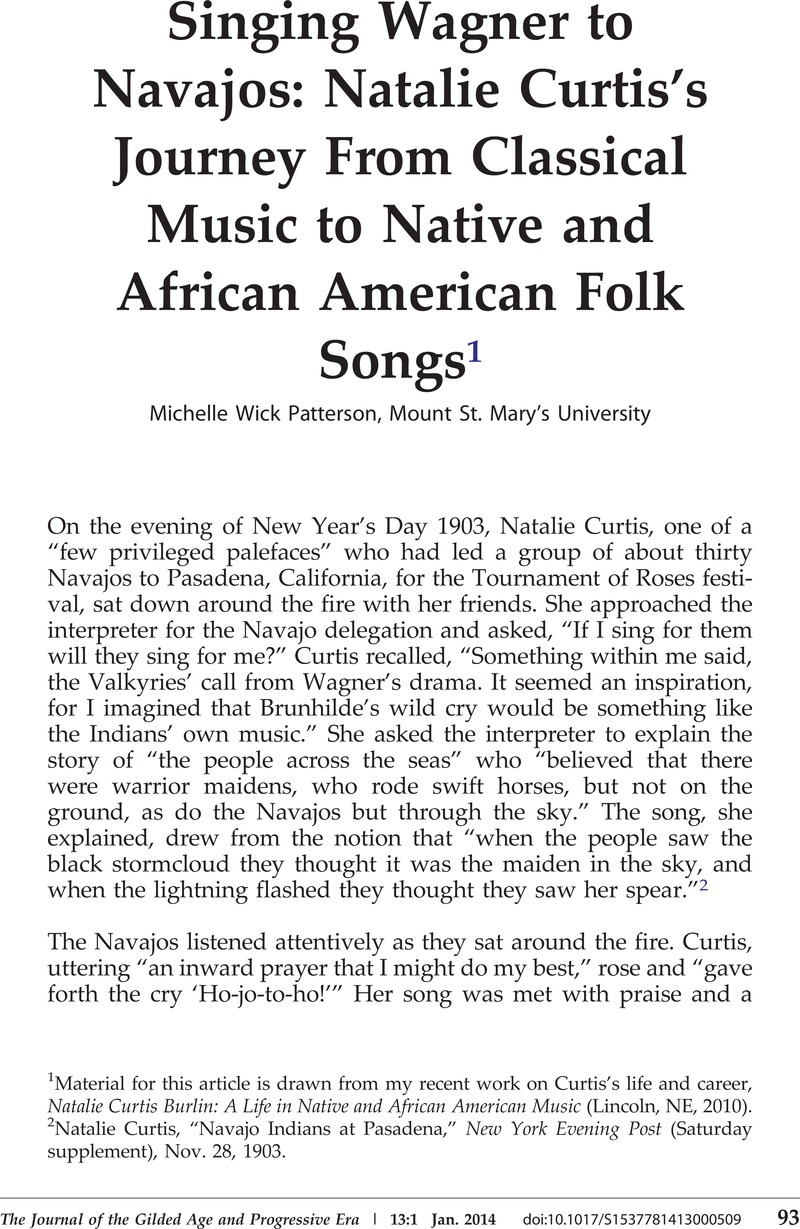No CrossRef data available.
Article contents
Singing Wagner to Navajos: Natalie Curtis's Journey From Classical Music to Native and African American Folk Songs1
Published online by Cambridge University Press: 16 January 2014
Abstract

- Type
- Forum: Women and American Music, Three Stories
- Information
- The Journal of the Gilded Age and Progressive Era , Volume 13 , Issue 1 , January 2014 , pp. 93 - 108
- Copyright
- Copyright © Society for Historians of the Gilded Age and Progressive Era 2014
Footnotes
Material for this article is drawn from my recent work on Curtis's life and career, Natalie Curtis Burlin: A Life in Native and African American Music (Lincoln, NE, 2010).
References
2 Natalie Curtis, “Navajo Indians at Pasadena,” New York Evening Post (Saturday supplement), Nov. 28, 1903.
3 Curtis, “Navajo Indians at Pasadena.”
4 Natalie Curtis, “An American Indian Composer,” Harper's Monthly, Sept. 1903, 626–32.
5 Patterson, Michelle Wick, “The ‘Pencil in the Hand of the Indian’: Cross-Cultural Interactions in Natalie Curtis's The Indians' Book,” Journal of the Gilded Age and Progressive Era 9 (Oct. 2010): 419–49CrossRefGoogle Scholar.
6 Milne, George, George William Curtis and the Genteel Tradition (Bloomington, IN, 1956), 118–21Google Scholar, 174–75.
7 Robert Kennedy, “Crisis and Progress: The Rhetoric and Ideals of a Nineteenth Century Reformer, George William Curtis (1824–1892)” (PhD diss., University of Illinois, 1993), 74, 90–101.
8 McPherson, James, The Abolitionist Legacy: From Reconstruction to the NAACP (Princeton, 1975)Google Scholar, 343.
9 Natalie Curtis to Elizabeth Day, June 29, 1890, Natalie Curtis Burlin Archives, in possession of Alfred and Virginia Bredenberg, Raleigh, North Carolina [hereafter NCB].
10 Curtis to Elizabeth Day, Aug. 25, 1892; undated 1892, NCB.
11 Roberge, Marc-Andre, “Ferruccio Busoni in the United States,” American Music 13 (Fall 1995): 295–332CrossRefGoogle Scholar.
12 Stuckenschmidt, H. H., Ferruccio Busoni: Chronicle of a European, trans. Morris, Sandra (New York, 1970), 178–83Google Scholar. For more on Busoni's pedagogy, see Busoni, Ferruccio, The Essence of Music and Other Papers, trans. Ley, Rosamond (New York, 1957)Google Scholar.
13 Joseph Matthews, “Busoni's Contributions to Piano Pedagogy” (PhD diss., Indiana University, 1977), 21.
14 Horowitz, Joseph, Wagner Nights: An American History (Berkeley, 1994), 200–06Google Scholar; Dizikes, John, Opera in America: A Cultural History (New Haven, 1993), 239–42Google Scholar.
15 Dizikes, Opera in America, 236–37.
16 Horowitz, Wagner Nights, 1, 8.
17 Horowitz, Wagner Nights, 90, 216, 224–25.
18 Curtis to Elizabeth Day, Feb. 24, 1892, NCB.
19 Curtis to Elizabeth Day, June 8, 1890, NCB. Lehmann refers to Lilli Lehmann, an opera singer the young women deeply admired for her portrayal of Wagnerian female roles.
20 Curtis to Elizabeth Day, Sept. 1, 1893, NCB.
21 Mason also became a patron for several artists and writers of the Harlem Renaissance.
22 Campbell, Bruce F., Ancient Wisdom Revived: A History of the Theosophical Movement (Berkeley, 1980), 8–10Google Scholar.
23 Tweed, Thomas A., The American Encounter with Buddhism, 1844–1912: Victorian Culture and the Limits of Dissent (Bloomington, IN, 1992), 50–70Google Scholar.
24 Braude, Ann, Radical Spirits: Spiritualism and Women's Rights in Nineteenth-Century America, 2nd ed. (Bloomington, IN, 2001)Google Scholar, 3. For another look at gender and Spiritualism, Goldsmith, Barbara, Other Powers: The Age of Suffrage, Spiritualism, and the Scandalous Victoria Woodhall (New York, 1998)Google Scholar.
25 Versluis, Arthur, American Transcendentalism and Asian Religions (Oxford, 1993), 3–8Google Scholar.
26 Curtis, Augusta, “Reminiscences of Bayreuth,” NCB; Frederic Spotts, Bayreuth: A History of the Wagner Festival (New Haven, 1994)Google Scholar, 6.
27 Tick, Judith, “Women as Professional Musicians in the United States, 1870–1900,” Yearbook for Inter-American Musical Research 9 (1973): 95–133Google Scholar.
28 Ammer, Christine, Unsung: A History of Women in American Music (Westport, CT, 1980), 72–74Google Scholar.
29 Levy, A. H., “Double-Bars and Double Standards: Female Composers in America, 1880–1920,” International Journal of Women's Studies 6 (Mar./Apr. 1983): 162–75Google Scholar; Tick, “Women as Professional Musicians in the United States,” 115.
30 On Arthur Farwell and the Press, Wa-Wan, Culbertson, Evelyn Davis, He Heard America Singing. Arthur Farwell, Composer, and Crusading Music Editor (Metuchen, NJ, 1992)Google Scholar; and Culbertson, “Arthur Farwell's Early Efforts on Behalf of American Music, 1889–1921,” American Music 5 (Summer 1987): 156–75CrossRefGoogle Scholar.


